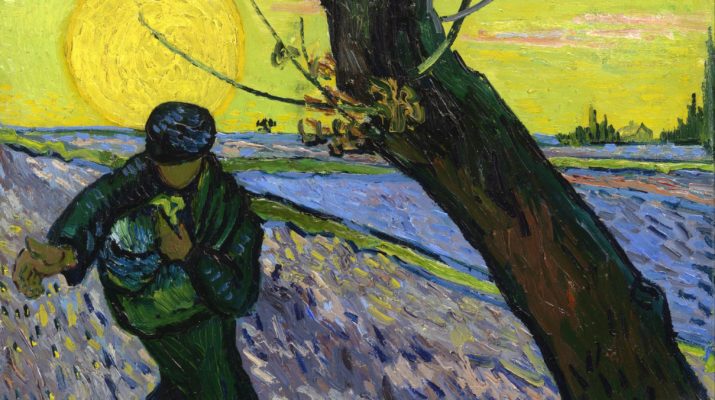2 Corinthians 9:6-15
Canadian Thanksgiving Day
6 The point is this: the one who sowsA sparinglyB will also reapC sparingly, and the one who sows bountifullyD will also reap bountifully.
A “sows” = speiro. Probably from spao (to pull or draw like one draws a sword). This is sowing a seed or scattering. It is sowing in a literal or figurative sense.
B “sparingly” = pheidomenos. 2x in NT – both in this passage. From pheidomai (to spare, refrain, or to treat with leniency). This is stingily or sparingly.
C “reap” = therizo. From theros (summer; the heat, which implies summer); from thero (to heat). This is to gather or harvest.
D “bountifully” = epi + eulogia. Literally, “upon blessings.” Eulogia is 16x in NT. From eulogeo (speaking well of – speaking so that the other is benefited; praise, bless, thank, or call for a blessing); {from eu (good, well, well done, rightly) + logos (word, statement, speech, analogy; a word that carries an idea or expresses a thought, a saying; a person with a message or reasoning laid out in words; by implication, a topic, line of reasoning, or a motive; can be used for a divine utterance or as Word – Christ); {from lego (to speak, tell, mention)}}. This is praise, blessing, or gift. It literally refers to eloquent speech, but can also be a consecration or gift.
7 EachE of you must give as you have made upF your mind,G
E “each” = hekastos. Perhaps from hekas (separate). This is each one, any, every. It is every individual as a distinct entity as opposed to those counted as a group in small sets.
F “made up” = proaireo. 1x in NT. From pro (before, in front of, earlier than) + haireo (to take, choose, or prefer); {probably related to airo (raise, take up, lift, remove)}. This is to propose, purpose, intend, choose.
G “mind” = kardia. Literally the heart, but figuratively mind, character, inner self, will, intention, thoughts, feelings. Also, the center of something. The word heart is only used figuratively in the Old and New Testaments. This is where “cardiac” comes from.
not regretfullyH or under compulsion,I for GodJ lovesK a cheerfulL giver.M
H “regretfully” = lupe. 16x in NT. This is pain, whether physical or mental. It includes grief, sorrow, distress, or a heavy heart.
I “compulsion” = anagke. 18x in NT. From ana (up, again, anew) + agcho (to press tightly, compress) OR related to agkale (the arm, particularly one that is bent to carry a load). This is necessity – something that happens that requires an immediate response. It is generally associated with pain or distress.
J “God” = Theos. From Proto-Indo-European origins, meaning do, put, place. This is God or a god in general.
K “loves” = agapao. Perhaps from agan (much). This is love, longing for, taking pleasure in. It is divine love or human love that echoes divine love.
L “cheerful” = hilaros. Related to “made up” in v7. 1x in NT. From hileos (forgiving, merciful, gracious, cheerful as benevolent; a way to say “far be it”); {from hilaos (gracious, benevolent) or from haireo (see note F above)}. This is cheerful, joyous, satisfied, willing. It is where the word “hilarious” comes from.
M “giver” = dotes. 1x in NT. From didomi (give, offer, place, bestow, deliver; give in a literal or figurative sense). This is a giver or bestower.
8 And God is ableN to provide you with everyO blessingP in abundance,Q
N “is able” = dunateo. 3x in NT. From dunatos (mighty or powerful; ability of persons, possibility of things; what can be given the power or ability that the subject exhibits); from dunamai (to be able, have power or ability). This is to be able or powerful. It is using power that cannot be stopped. It is the same root as the Greek word for “miracle.”
O “every” = pas. This is all or every.
P “blessing” = charis. From chairo (to rejoice, be glad; used to say hello; properly, delighting in the grace of God or experiencing God’s favor); from char– (to extend favor, lean towards, be inclined to be favorable towards). This is grace, kindness, favor, gratitude, thanks. It is the sense of being inclined to or favorable towards – leaning towards someone to share some good or benefit. This can be literal, figurative, or spiritual. It is grace as abstract concept, manner, or action.
Q “provide…in abundance” = perisseuo. From perissos (abundant, more, excessive, advantage, vehemently); from peri (all-around, encompassing, excess). This is more than what is ordinary or necessary. It is abounding, overflowing, being leftover, going above and beyond. It is super-abounding in number or quality.
so that by alwaysR havingS enoughT of everything,
R “always” = pas + pantote. Pas is the same as “every” in v8. See note O above. Pantote is related to “every” in v8. From pas (see note O above) + tote (then, whether past or future); {from hote (when); from ho (the)}. This is literally every when. It is always, at all times.
S “having” = echo. This is to have, hold, possess.
T “enough” = pas + autarkeia. Literally, “all sufficiency.” Pas is the same as “every” in v8. See note O above. Autarkeia is 2x in NT. From autarkes (contented, independent, having enough); {from autos (he, she, self, they, same) + arkeo (to assist, be satisfied or sufficient; properly, to ward off, by extension being satisfactory)}. This is independence or self-sufficiency.
you may share abundantlyU in every goodV work.W
9 As it is written,X
“He scatters abroad;Y he givesZ to the poor;AA
U “share abundantly” = perisseuo. Same as “provide…in abundance” in v8. See note Q above.
V “good” = agathos. This is good, a benefit, or a good thing. It is good by its very nature, intrinsically good. A different word, kalos, refers to external signs of goodness.
W “work” = ergon. From ergo (to work, accomplish, do). This is work, task, deed, labor, effort.
X “written” = grapho. This is to write or describe. It is where the word “graphic” comes from.
Y “scatters abroad” = skorpizo. 5x in NT. This is to scatter, distribute, dissipate, waste, cause to flee.
Z “gives” = didomi. Related to “giver” in v7. See note M above.
AA “poor” = penes. 1x in NT. From penomai (working for a living; laborer, poor person; to work for daily bread) OR from peno (to toil to survive day by day). This is someone who works, a poor person. It could also imply someone who is starving.
his righteousnessBB enduresCC forever.”DD
BB “righteousness” = dikaiosune. From dikaios (correct, righteous – implies innocent; this is that which conforms to God’s notion of justice, uprightness); from dike (the principle of justice; that which is right in a way that is very clear; a decision or the execution of that decision; originally, this word was for custom or usage; evolved to include the process of law, judicial hearing, execution of sentence, penalty, and even vengeance; more commonly, it refers to what is right); may be from deiknumi (to show, point out, exhibit; figurative for teach, demonstrate, make known). This is judicial or divine approval of character or action. This is righteousness, justice, justness, divine righteousness.
CC “endures” = meno. This is to stay, remain, wait, await, continue, abide, endure. It can mean to literally stay in a place or to remain in a condition or to continue with hope and expectation.
DD “forever” = eis + ho + aion. Literally, “to the age.” Aion is from the same as aei (ever, always, unceasingly, perpetually; on every occasion). This is an age, cycle of time, course, continued duration. It is also used to describe the eternal or forever. This is the word used to discuss the present age or the messianic age.
10 He who suppliesEE seedFF to the sowerGG and breadHH for foodII
EE “supplies” = epichoregeo. 5x in NT. From epi (on, upon, against, what is fitting) + choregeo (to be the leader of a performing group, to help pay the expenses of a chorus; thus, to supply, furnish); {from choros (a dance or chorus) + ago (lead, bring, carry, guide, drive, go)}. This is lavishly provide or supply. It can also mean to help, nourish, or contribute.
FF “seed” = sporos. Related to “sows” in v6. 6x in NT. From speiro (see note A above). This is seed or a seed that is already scattered. It is where the word “spore” comes from.
GG “sower” = speiro. Same as “sows” in v6. See note A above.
HH “bread” = artos. Related to “made up” and “cheerful” in v7. Perhaps from airo (see note F above). This is bread or a loaf. It is a loaf as raised.
II “food” = brosis. 11x in NT. From bibrosko (to eat). This is food and the act of eating. It is eating in a literal or figurative sense.
will supplyJJ and multiplyKK your seed for sowingLL and increaseMM the harvestNN of your righteousness.
JJ “supply” = choregeo. Related to “supplies” in v10. 2x in NT. See note EE above.
KK “multiply” = plethuno. 12x in NT. From plethos (fullness, multitude, great number); from pletho (to fill, accomplish, supply; to fill to maximum capacity). This is to increase, multiply, or abound. It is filling to its greatest potential or utmost capacity.
LL “seed for sowing” = sporos. Same as “seed” in v10. See note FF above.
MM “increase” = auxano. From auksano (to grow or enlarge, whether literal or figurative). This is growing whether in size or mature or greatness or some other metric.
NN “harvest” = gennema. 8x in NT. From gennao (to beget, give birth to, or bring forth; properly, procreation by the father, but used of the mother by extension; figuratively, to regenerate); from genna (descent, birth); from genos (family, offspring, kin – in a literal or figurative sense); from ginomai (to come into being, to happen, become, be born; to emerge from one state or condition to another; this is coming into being with the sense of movement or growth). This is offspring, child, fruit, brood, or produce in a literal or figurative sense.
11 You will be enrichedOO in every way for your greatPP generosity,QQ which will produceRR thanksgivingSS to God through us,
OO “enriched” = ploutizo. Related to “multiply” in v10. 3x in NT. From ploutos (abundance, wealth, or riches; money, possessions, spiritual abundance, or a valuable bestowment); from polus (much, many, abundant) OR pleo (to sail, voyage); {probably from pluno (to plunge – so to wash); from pluo (to flow)} OR pletho (see note KK above). This is to enrich, cause abundance, bring fullness.
PP “great” = pas. Same as “every” in v8. See note O above.
QQ “generosity” = haplotes. Related to “enriched” in v11. 8x in NT. From haplous (properly, unfolded; simple as a single thing; sound, perfect, fixed focus without ulterior motive); {from a (with) + perhaps ploos (voyage, navigation)}; {from pleo (see note OO above)}}. This is singleness, simplicity, purity, bountifulness. It is sincerity that is not self-seeking. Objectively, this can be generosity.
RR “produce” = katergazomai. Related to “work” in v8. From kata (down, against, throughout, among, daily) + ergazomai (to work, labor); {from ergon (see note W above)}. This is working something until it is completed, working fully, accomplishing, producing, achieving, performing.
SS “thanksgiving” = eucharistia. Related to “bountifully” in v6 & to “blessing” in v8. 15x in NT. From eucharistos (thankful, well favored); {from eu (see note D above) + charis (see note P above)}. This is thankfulness or thanksgiving. It is active gratitude. It is related to the word “eucharist.”
12 for the renderingTT of this ministryUU not onlyVV suppliesWW
TT “rendering” = diakonia. Perhaps from dia (through, across to the other side, thoroughly) + konis (dust) OR from dioko (to chase after, put to flight; by implication, to persecute or to purse like a hunter after its prey; this can be earnestly pursue or zealously persecute) {related to dio (put to flight)}. This is service, ministry, attending someone, service. It can mean serving someone at a table or otherwise as their servant/slave. It is also used for people who serve/minister in temples, as well as the work of Christian ministry. Figuratively, this word can mean money given for charity. This shares a root with “deacon” and is where the word “diaconate” comes from.
UU “ministry” = leitourgia. Related to “work” in v8 & “produce” in v11. 6x in NT. From leitourgeo (to minister or serve the public in an authorized capacity; to act in a charitable capacity); from leitourgos (a public servant, a minister, or other kind of servant; it can be used of priests and Levites; anyone who serves or ministers for the community’s good); {from laos (people, crowd, the chosen people) + ergon (see note W above)}. This is a service or ministry. It could be an official or administrative service. It could also refer to ministry in a temple by a priest or a gift given by an almsgiver. It is where the word “liturgy” comes from.
VV “only” = monon. Related to “endures” in v9. From monos (alone, single, remaining, mere, desolate); from meno (see note CC above). This is merely, only, simply, sole. It can also imply alone.
WW “supplies” = eimi + prosanapleroo. Eimi is to be, exist. Prosanapleroo is related to “multiply” in v10 & “enriched” in v11. 2x in NT – both in 2 Corinthians. From pros (at, to, toward, with) + anapleroo (to fill up, supply, occupy, fulfil; adding what is missing so that something can be full); {from ana (up, again, back, among, anew) + pleroo to fill, make full or complete; properly, filling something up to the maximum extent or induvial capacity; used figuratively for furnish, influence, satisfy, finish, preach, perfect, and fulfill); {from pleres (to be full, complete, abounding in, occupied with); from pletho (see note KK above)}}. This is to furnish or supply fully.
the needsXX of the saintsYY but also overflowsZZ with manyAAA thanksgivings to God.
XX “needs” = husterema. 9x in NT. From hustereo (to fall behind, come late, be interior, suffer need, be left out); from husteros (last, later). This is something lacking. So it could be a need or a defect. It could be a shortcoming or poverty.
YY “saints” = hagios. From hagnos (holy, sacred, pure ethically, ritually, or ceremonially; prepared for worship, chaste, unadulterated, pure to the core; undefiled by sin; figurative for innocent, modest, perfect). God is totally different from humanity and thus set apart. That which is consecrated to worship God (elements of worship) or to serve God (as the saints) are holy because they are now set apart for God’s purposes. Holy because important to God. This is sacred physically, pure. It can be morally blameless or ceremonially consecrated.
ZZ “overflows” = perisseuo. Same as “provide…in abundance” in v8. See note Q above.
AAA “many” = polus. Related to “enriched” in v11. See note OO above.
13 Through the testingBBB of this ministryCCC you glorifyDDD God
BBB “testing” = dokime. 8x in NT. From dokimos (what passes the test, approved, acceptable, genuine, verified); from dechomai (to warmly receive, be ready for what is offered, take, accept, or welcome; to receive in a literal or figurative sense) or dokeo (to have an opinion, seem, appear, suppose; a personal judgment; to think); {from dokos (opinion)} This is something that is being proved or tried in the sense of being tested. It can refer to the ordeal itself or imply something that has passed the test – that is genuine, trustworthy, or of good character.
CCC “ministry” = diakonia. Same as “rendering” in v12. See note TT above.
DDD “glorify” = doxazo. Related to “testing” in v13. From doxa (glory, opinion, praise, honor, renown; particularly used as a quality of God or manifestation of God – splendor); from dokeo (see note BBB above). This is to render or hold something as glorious, to glorify, honor, magnify, or celebrate. This is ascribing weight to something by recognizing its true value or essence.
by your obedienceEEE to the confessionFFF of the gospelGGG
EEE “obedience” = hupotage. 4x in NT. From hupotasso (to place under; to subject, submit, obey, or subordinate); {from hupo (by, under, about, under one’s authority) + tasso (to arrange, appoint, determine)}. This is submission, obedience, or control.
FFF “confession” = homologia. Related to “bountifully” in v6. 6x in NT. From homologeo (to agree, speak the same, declare, promise, praise, celebrate; to align with, express the same conclusion, endorse); {from homologos (of one mind); {from homos (the same) + lego (see note D above)}}. This is agreement, confession, acknowledgment. It is professing or affirming a conclusion.
GGG “gospel” = euaggelion. Related to “bountifully” in v6 & “thanksgiving” in v11 & to “supplies” and “supply” in v10. From eu (see note D above) + aggelos (angel, messenger; a messenger from God bringing news – whether a prophet or an angel); {from aggellos (to bring tidings); probably from ago (see note EE above)}. This is literally “the good news,” used for the gospel. This is also where “evangelism” comes from.
of ChristHHH and by the generosity of your partnershipIII with them and with all others,JJJ
HHH “Christ” = Christos. From chrio (consecrate by anointing with oil; often done for prophets, priests, or kings). Literally, the anointed one, Christ. The Greek word for Messiah.
III “partnership” = koinonia. 19x in NT. From koinonos (partner, companion, partaker, sharer); From koinos (common, shared, unclean, ritually profane); probably from sun (with, together with). This is sharing in common so it is fellowship, participation, communion, and aid that comes from the community.
JJJ “all others” = pas. Same as “every” in v8. See note O above.
14 while they longKKK for you and prayLLL for you because of the surpassingMMM graceNNN of God that he has given you.
KKK “long” = epipotheo. 9x in NT. From epi (on, upon, at, what is fitting) + potheo (to yearn). This is to long for, greatly desire, or strain towards. It can also imply doting or a desire to possess something or someone, whether legitimately or wrongfully.
LLL “pray” = deesis. 18x in NT. From deomai (having an urgent need because one is missing or needing something so it is an earnest appeal or pressing request); from deo (to tie, bind, fasten, impel, compel; to declare something against the law or prohibited). This is a request coming from a deep personal need or want. So, it is supplication or prayer.
MMM “surpassing” = huperballo. 5x in NT. From huper (over, above, beyond) + ballo (to throw, cast, place, put, rush, drop). This is to surpass, exceed, or excel. Properly, it is to throw beyond or run beyond. So, it is transcending, eminent, or surpassing. This shares the same root as “hyperbole.”
NNN “grace” = charis. Same as “blessing” in v8. See note P above.
15 ThanksOOO be to God for his indescribablePPP gift!QQQ
OOO “thanks” = charis. Same as “blessing” in v8. See note P above.
PPP “indescribable” = anekdiegetos. Related to “supplies” and “supply” in v10 & “gospel” in v13. 1x in NT. From a (not, without) + ekdiegeomai (to report or describe fully – the reporter having thorough knowledge of the issue at hand); {from ek (from, from out of) + diegeomai (to describe fully, narrate, declare, tell something clearly so that one knows what is most important); {from dia (through, because of, across, thoroughly) + hegeomai (to think, suppose, have an opinion; to lead the way, what comes in front or first, initial thought, high esteem or authority; one who commands in an official capacity); {from ago (see note EE above)}}}. This is inexpressible, inexplicable, or indescribable.
QQQ “gift” = dorea. Related to “giver” in v7 & “gives” in v9. 11x in NT. From doron (gift, offering, sacrifice; emphasizes that the gift is given freely, voluntarily); from didomi (see note M above). This is a free gift given voluntarily and not received by merit or entitlement. It emphasizes the benevolence of the giver.
Image credit: “The Sower III (version 2)” by Vincent van Gogh, 1888.




